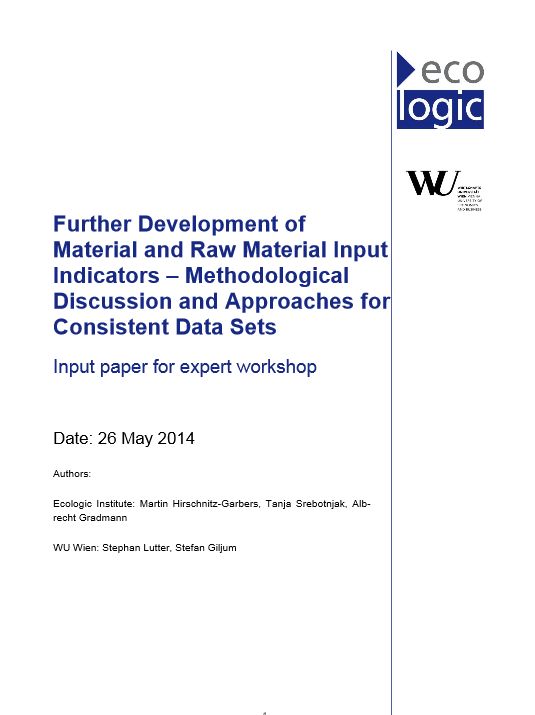International Governance for Environmentally Sound Supply of Raw Materials – Policy Options and Recommendations
Final Report
- Publication
- Citation
Bodle, Ralph et. al. (2020): International Governance for Environmentally Sound Supply of Raw Materials – Policy Options and Recommendations. Dessau-Roßlau: Umweltbundesamt.
This research report of the Ecologic Institute addresses how Germany can contribute, through international governance, to reduce the environmental impacts of mining activities outside its territory. It provides a stocktake of existing governance approaches at the international level or with transboundary effect. It then develops specific policy options and recommendations for the German federal government to strengthen international governance for an environmentally sound supply of raw materials.
The scope included the extraction of abiotic raw materials up to processing and smelting. In terms of impacts, it included social impacts where they are linked to the environment.
Mineral extraction activities can have significant impacts on the environment during all stages of the life cycle of a mine, from exploration to construction and operation, and up to closure. Impacts also occur along the value chain of raw materials, including processing, treatment and transport. With the demand for raw materials increasing worldwide and value chains spreading across different countries, international approaches can contribute to making mineral extraction adhere to environmental standards.
- Language
-
English
- Authorship
-
Dr. Heidi StockhausDr. Christiane GerstetterLena Donat, LLMInga Bach, LLMAndreas Hermann (Öko-Institut)Andreas Manhart (Öko-Institut)Dr. Doris Schüler (Öko-Institut)Dr. Peter Gailhofer (Öko-Institut)Moritz Lörcher (Project Consult)Heidi Feldt (Project Consult)Viviana Lozano Castro (Project Consult)Isabelle Baudin (Project Consult)Aarti Mona Soerensen (Project Consult)
- Funding
-
German Environment Agency (UBA), Germany - Published by
-
German Environment Agency (UBA), Germany - Year
- Dimension
- 411 pp.
- ISSN
-
1862-4804
- Project
- Project ID
- Table of contents
-
Click to show full table of contents
Summary
Zusammenfassung
1 Introduction
1.1 Background
1.2 Objectives of the study
1.3 Approach and Methodology
2 Stocktake of existing approaches
2.1 International treaty law and customary law relevant to the extraction and trade of raw materials
2.2 Non-binding international standards addressing mining activities
2.3 National and European law with extraterritorial effects
2.4 Case studies on experience with implementation of instruments
3 Overall assessment of the governance framework
3.1 International law
3.2 Non-binding standards addressing mining activities
3.3 National and European law with extraterritorial effects
3.4 Case studies
4 Conceptual approaches to strengthen international governance
4.1 Normative view: binding rules and obligations
4.2 Non-binding standards
4.3 Cooperation
5 Policy options and recommendations
5.1 International legally binding instruments
5.2 Non-binding international standards
5.3 Strengthen bilateral and international cooperation
5.4 Further explore opportunities for extraterritorial impact and for combining legal instruments with non-binding standards
6 References - Keywords
-
International treaty law, customary law, raw materials, permanent sovereignty, natural resources, transboundary environmental harm, common heritage of mankind, precautionary principle, polluter pays principle, environmental impact assessment, state responsibility, Paris Agreement, United Nations Convention on the Law of the Sea, Agreement on the Implementation of Part XI of the 1982 Convention on the Law of the Sea, Minamata Convention, Amazon Cooperation Treaty, Convention on the Protection and Use of Transboundary Watercourses and International Lakes, World Heritage Convention, Antarctic Treaty System, Convention on Biological Diversity (CBD), Convention on Environmental Impact Assessment, Convention to Combat Desertification, Human rights and social rights treaties, International Covenant on Civil and Political Rights (ICCPR), International Covenant on Economic, Social and Cultural Rights (ICESCR), International Labour Organisation, American Convention on Human Rights, International trade and investment law, General Agreement on Tariffs and Trade (GATT), General Agreement on Trade in Services (GATS), Agreement on Technical Barriers to Trade, Government Procurement Agreement, CETA, COMESA, EU-Colombia/Peru, binding international law, non-binding international standards, mining, OECD Due Diligence Guidance, The World Bank Environmental and Social Framework, Towards Sustainable Mining (TSM), Fairmined, Fairtrade, Aluminium Stewardship Initiative (ASI), base metals, conflict minerals, cobalt, National and European law, extraterritorial effects, EU Timber Regulation, French law on the duty of vigilance of parent companies and ordering companies, US Alien Tort Statute, EU Public Procurement Directive, EU Corporate Social Responsibility (CSR) Directive, EU Conflict Minerals Regulation, EU Renewable Energy Directive, Certified Trading Chain (CTC), ASM, Minamata Convention, Mining Association of Canada, international governance, direct regulation, investment agreements, indirect regulation, Espoo-Convention, UNECE area, UN Convention to Combat Desertification (UNCCD), Convention on the Protection and Use of Transboundary Watercourses, UNCLOS, ILO Conventions, environmental reporting, EITI, ISO Standard, innovative supply chain initiativesEurope, Democratic Republic of Congo, France, Peru, Canadaassessment of instruments, case studies, analysis, stocktake
Conference:Raw Materials & Environment 2019 – International Conference
- Date
-
-
- Location
- Berlin, Germany
Langsdorf, Susanne; Stelljes, Nico; Hirschnitz-Garbers, Martin. 2018. EU's future R&I needs in the fields of 'climate action, environment, resource efficiency and raw materials'. RECREATE Summary Pocket Booklet.
Lutter, S., Giljum, S, Hirschnitz-Garbers, M., Srebotnjak, T., and Gradmann, A., 2014: Further Development of Material and Raw Material Input Indicators – Methodological Discussion and Approaches for Consistent Data Sets: Input paper for expert workshop. Report for a research project funded under the German Federal Environment Agency’s UFOPLAN programme. (FKZ: 3713 93 150).
Legal Instruments to Implement the Objective "Land Degradation Neutral World" in International Law
- Duration
-
-
- Funding
-
German Environment Agency (UBA), Germany
Research Network in Climate, Resource Efficiency and Raw Materials (RECREATE)
- Duration
-
-
- Funding
-
European Commission, Directorate-General Research & Innovation (DG Research & Innovation), International
Resource Policy (PolRess)
- Duration
-
-
- Funding
-
German Environment Agency (UBA), Germany
Models, Potentials and Long-Term Scenarios for Resource Efficiency (SimRess)
- Duration
-
-
- Funding
-
German Environment Agency (UBA), Germany

